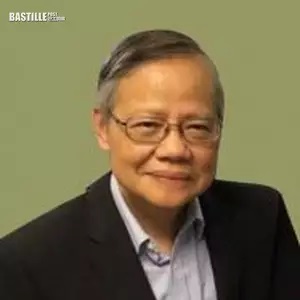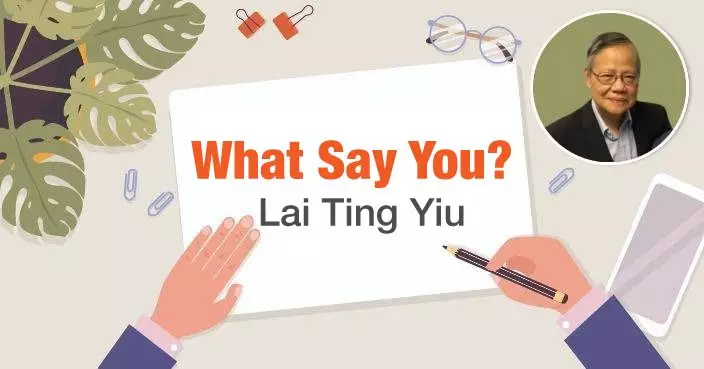A Tale of Two Riots
This week marks a rather awkward anniversary. It’s been six years since the "612" incident kicked off the "black riots" in Hong Kong, plunging the city into months of chaos. Across the globe, some of the self-styled "brothers and sisters" of that movement, now living in exile, will dutifully commemorate the event, chanting the old slogans about their "revolution."
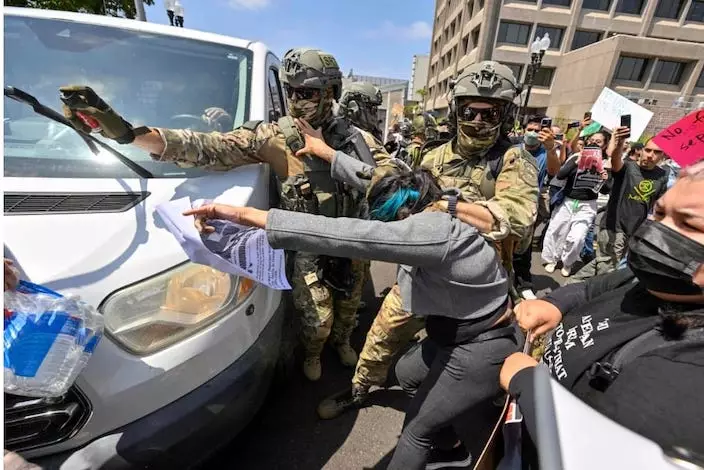
Trump deployed three hard-line tactics against the Los Angeles riots, using extreme high-pressure control and implementing a strike-first strategy. While controversial, it can effectively quell unrest
But here's the kicker. At this very moment, Los Angeles is engulfed in its own major riots. And guess who's in charge of the crackdown? None other than Donald Trump, the very same man who once championed Hong Kong's "resistance." He’s now the one unleashing a barrage of tough measures, promising to crush the unrest without mercy. This glaring double standard has got people talking. A friend of mine put it best: those Hong Kong activists who loved marching with American flags—do they dare take their protest to Los Angeles now? They might just get a real-time lesson in what American-style authoritarianism truly feels like. If the Hong Kong government had opted for the “American way”, the riots would’ve been snuffed out in weeks, not months.
Let's break down Trump's riot-control playbook and see how it compares to Hong Kong's hesitant response six years ago.
Move #1: Define the Narrative—Harshly.
Trump didn't hesitate for a second. He immediately branded the protests as "riots," driven by "professional agitators," and is even preparing to label them an "insurrectionist." His Homeland Security Secretary, Kristi Noem, calls the participants "mobs."
By refusing to define this as a legitimate protest, the government gives itself the green light to send in the National Guard. He’s even escalated it to a "foreign invasion" because protesters were seen waving Mexican flags, framing it as an attack on national sovereignty.
Now, cast your mind back to Hong Kong in 2019. The authorities dithered, umming and aahing over whether to call it a "riot." This vagueness sent a clear signal to the troublemakers that the government was weak. As a result: They only got bolder. And let's not forget the sea of American and British flags at those protests. Yet the charge of "foreign invasion" was never levelled, a courtesy Trump certainly isn't extending now.
Move #2: Overwhelming Force—Immediately.
Trump's second move: Hit them hard and fast. He invoked powers under Title 10 of the United States Code to bypass the California governor and directly mobilize the National Guard and even the Marines. The strategy is clear: strike first with overwhelming force before the chaos can spread.
The Hong Kong police, in the early days, were constantly on the back foot, playing a city-wide game of whack-a-mole. They were purely reactive, rushing to put out fires wherever they flared up, leaving them exhausted and outmanoeuvred. It wasn't until December of that year, when Tang Ping-keung took over as Commissioner of Police, that the strategy shifted, culminating in the decisive victory at the siege of PolyU which finally turned the tide.
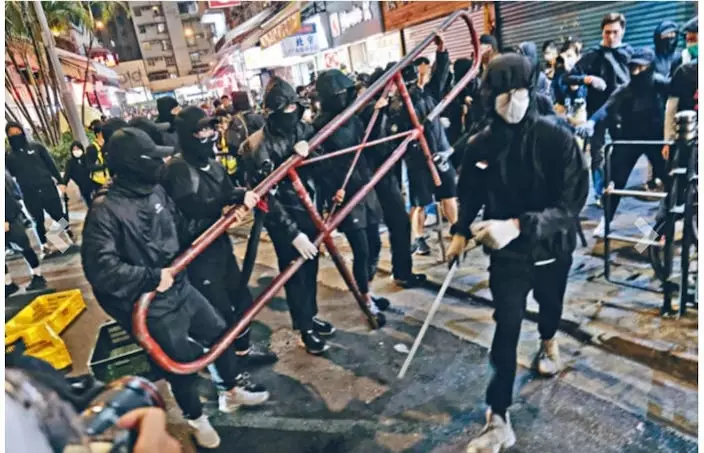
Compared to Trump's methods, the Hong Kong government had several strategic problems in the early stages of the black riots, causing the chaotic situation to continue until later strategic and attitudinal adjustments finally turned the tide.
Move #3: Lockdown and Control.
Trump's third tactic is the lockdown. He forced Los Angeles Mayor Karen Bass to declare a curfew, allowing police to launch mass arrests and clear the streets entirely—journalists included. It’s a hardline tactic that stops looting, sure, but more importantly, it prevents protesters from gathering and organizing.
The Hong Kong government talked about imposing a curfew, but ultimately got cold feet. They were worried about the economic fallout and, crucially, damage to Hong Kong's international image. So, the idea remained a "backup option" that was never used.
A practical lesson for Hong Kong
Looking at Trump's strategy, it’s unapologetically authoritarian. He’s chosen to apply thunderous force to extinguish the flames before they can become an inferno. As for what the world thinks of America's commitment to democracy and human rights? Frankly, he doesn't seem to give a damn.
And here's the uncomfortable truth: from a purely operational standpoint, he's probably right. Had the Hong Kong government adopted such a harsh approach from the get-go, the "black riots" of 2019 might have been a much shorter, and less destructive, chapter in the city's history.
Lai Ting-yiu
What Say You?
** The blog article is the sole responsibility of the author and does not represent the position of our company. **
Think back to Hong Kong's turbulent years. Jimmy Lai had three brothers-in-arms, comrades he bankrolled through thick and thin – Cardinal Joseph Zen, Martin Lee, and Anson Chan. But their bonds weren't just ideological. Money changed hands, and plenty of it. Anson Chan pocketed HK$3.5 million from Lai's war chest. Cardinal Zen took in far more – at least HK$26 million in secret donations that the Hong Kong Diocese never knew about and never investigated. Where did all that cash go? That's the million-dollar question. Or rather, the 26-million-dollar question that remains unanswered.
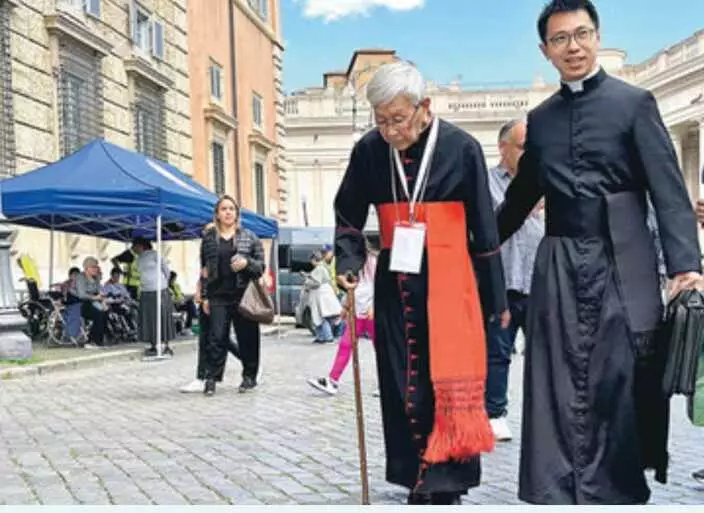
Cardinal Zen met Pope Leo XIV in Rome, reportedly pushing for Jimmy Lai's release – but Vatican intervention looks unlikely.
Word broke earlier that Cardinal Zen just made a pilgrimage to the Vatican for a sit-down with the newly minted Pope Leo XIV. The private meeting lasted about an hour. On the agenda: the conviction of "Catholic" Jimmy Lai. Sources say Zen pressed the pontiff hard to "save Lai." What did the Pope say? Nobody's talking. But you can bet the Vatican knows all about the questionable financial ties between Zen and Lai – a relationship the Cardinal has never properly explained to his own Diocese. Did personal interests play a role? The doubts are real.
A Vatican Gambit
Cardinal Zen's "612 Humanitarian Relief Fund" case is still grinding through the courts, and authorities had confiscated his passport. But when the Vatican called its recent "Special Consistory" – bringing cardinals from around the world to Rome – the court granted him temporary travel privileges. During the gathering, Pope Leo XIV carved out time for a private one-on-one with Zen after a breakfast session. The topics? Whether the China-Vatican agreement should be renewed, and the fate of Jimmy Lai, now convicted under Hong Kong's National Security Law. But whether the Pope took any position on Lai remains under wraps.
Zen views Jimmy Lai as both a close friend and a comrade-in-arms, so naturally he's pushing the Vatican to intervene. But here's the Vatican's dilemma: it's not just about China-Vatican relations. It's about the unresolved financial relationship between Zen and Lai – a relationship that has seriously damaged the Cardinal's credibility.
The Secret Pipeline
October 2011 brought a massive leak. Jimmy Lai's secret donations to political parties, politicians, and organizations spilled into public view – and Joseph Zen, then Bishop of Hong Kong, was on that list. Between 2006 and 2010, he received HK$20 million from Lai over four years. From 2012 to 2014, another HK$6 million landed in his hands. The total: a staggering HK$26 million.
When the news broke, Zen went silent. Only after relentless media pressure did he offer an explanation, claiming the money went to support underground churches in the Chinese Mainland and other charitable organizations. With a casual smile, he described himself as a "spendthrift," saying most of the money had already been spent with only a few hundred thousand remaining – and even expressed hope that Lai would keep the donations coming.
Talk is cheap. He provided no concrete evidence to back up his claims. The Hong Kong Diocese knew nothing about his receipt of this massive sum from Lai – the entire "money pipeline" operated in secret. To this day, he has never given the Diocese a complete accounting.
Because this financial channel remained so deeply hidden, suspicions naturally arose that personal interests were involved. But given Cardinal Zen's position, the Diocese refrained from investigating him. The true destination of the funds? Still shrouded in doubt.
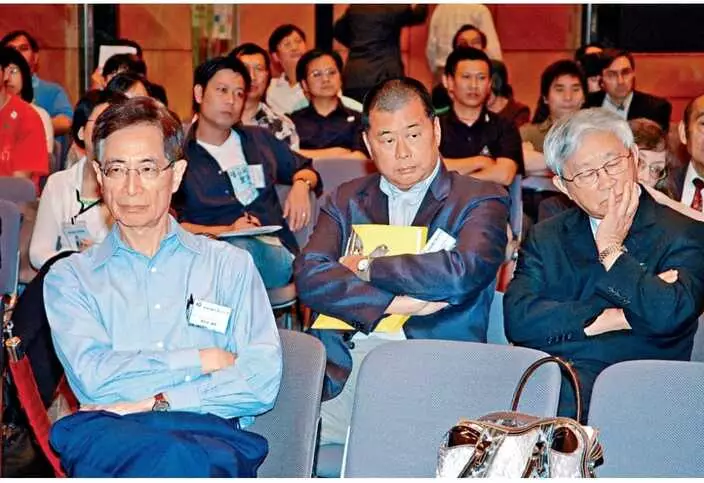
HK$26 million from Jimmy Lai to Cardinal Zen – Diocese in the dark, money's whereabouts still a mystery. The trio behind Hong Kong's unrest!
Vatican Cold Shoulder
Cardinal Zen's questionable relationship with Jimmy Lai, combined with his overly hawkish stance toward China, put him in the Vatican's bad books after Hong Kong's National Security Law took effect in late June 2020. Around that time, Zen traveled uninvited to the Vatican, demanding a meeting with then-Pope Francis to discuss Hong Kong's bishop selection and issues facing underground churches in the Mainland. The Pope gave him zero face. Francis refused to see him. After cooling his heels in Rome for four days with nothing to show for it, Zen returned to Hong Kong empty-handed.
Later, Zen and Lai joined forces on Jimmy Lai's "Live Chat" livestream program to blast the Vatican, accusing it of staying silent on underground churches, Tibet, and Hong Kong human rights issues. This clearly shows how the "Zen-Lai duo" consistently conspired to incite underground church activities in the Mainland, stir up religious conflicts, and undermine China-Vatican relations.
Cardinal Zen's latest Vatican trip for a private papal audience, where he lobbied to "save Lai" and reiterated his opposition to renewing the China-Vatican agreement, proves one thing: at 94 years old, the cardinal's anti-China, pro-chaos heart hasn't changed one bit.
Long Odds
The new Pope's willingness to meet him represents a slight thaw from his predecessor's icy attitude. But the chances of Vatican intervention to "save Lai"? Extremely low. The unresolved questions about Zen's financial relationship with Jimmy Lai have significantly diminished his influence with the Vatican.
From a legal perspective, his cardinal status currently shields him from serious consequences. But risks remain. Perhaps it's time for him to follow Anson Chan's example and retire from such activities while he still can.
Lai Ting-yiu





